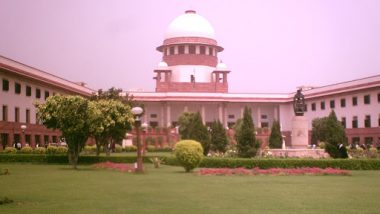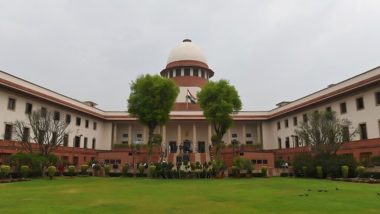New Delhi, September 27: In another crucial verdict, the Supreme Court gave its judgement on pleas challenging the constitutional validity of the penal law on adultery. Supreme Court has struck down Section 497 as unconstitutional. The Apex Court has quashed the Adultery law as a criminal offence on a unanimous judgement. Adultery Law: Centre Opposes Plea in Supreme Court That Seeks to Make Men And Women Equally Liable Under Section 497.
CJI Dipak Misra said that women must be treated with equality with men. No discrimination permitted under the Constitution. He further added that women can't be asked to think in accordance with the society. Adultery May Not be Cause But Result of Unhappy Marriage: Highlights of SC Verdict on Section 497.
#WATCH: Petitioner's lawyer Kaleeswaram Raj explains the Supreme Court's verdict that declared section 497 (Adultery) of the IPC unconstitutional pic.twitter.com/8zYaWMzJcW
— ANI (@ANI) September 27, 2018
CJI said that Section 497 violates Article 14, which says that the state shall not deny to any person equality before the law or the equal protection of the laws within the territory of India. They have declared Section 497 as unconstitutional.
Misra states, he has relied heavily on Triple Talaq judgment of Justice Rohinton Nariman. "Discrimination will invite the wrath of the Constitution. Equality is the fundamental principle. 2 judges declare Section 497 as arbitrary and it offends the dignity of women.
Misra further added, "Adultery can be ground for civil issues including dissolution of marriage but it cannot be a criminal offence. Adultery might not be the cause of an unhappy marriage, it could be the result of an unhappy marriage."
Justice DY Chandrachud strruck down Section 497 for violation of Articles 14, 21. The Section perpetuates subordinate status of women, denies dignity and sexual autonomy.
Justice Indu Malhotra added dultery could be a moral wrong towards spouse and family but question is whether it should be a criminal offence?
A five-judge constitution bench headed by Chief Justice Dipak Misra on August 8 had reserved its verdict after Additional Solicitor General Pinky Anand, appearing for the Centre, concluded her arguments. The hearing for the case comprised of bench members including R F Nariman, A M Khanwilkar, D Y Chandrachud and Indu Malhotra.
The Centre had favoured retention of penal law on adultery, saying that it is a public wrong which causes mental and physical injury to the spouse, children and the family.
What is Section 497 of IPC?
Section 497 of the 158-year-old Indian Penal Code says- "Whoever has sexual intercourse with a person who is and whom he knows or has reason to believe to be the wife of another man, without the consent or connivance of that man, such sexual intercourse not amounting to the offence of rape, is guilty of the offence of adultery."
According to a Bar & Bench report, the law does not give any right to a woman to prosecute her husband should he be in an adulterous relationship. In this backdrop, the petition prompted the Court to revisit whether the Section was liable to be struck down, inter alia, for being violative of gender equality.
Reportedly, in January this year, a three-judge bench led by Chief Justice of India Dipak Misra referred the case to a Constitution Bench. While doing so, an observation was also made that the law was archaic and looked at women as objects or ‘chattel’ owned by their husbands. These concepts needed to be revisited in a progressive society, the Court had opined.
(With inputs from PTI)
(The above story first appeared on LatestLY on Sep 27, 2018 11:20 AM IST. For more news and updates on politics, world, sports, entertainment and lifestyle, log on to our website latestly.com).













 Quickly
Quickly




















